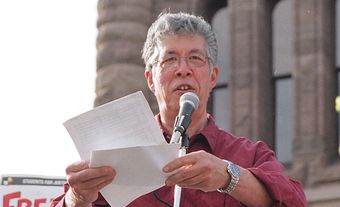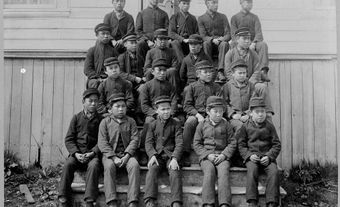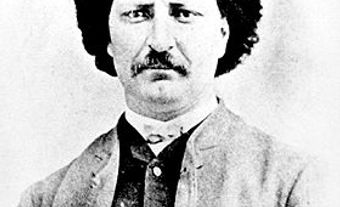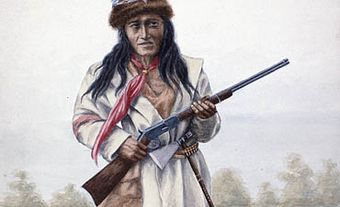Michelle Frances Good, author, lawyer, poet (born 7 October 1956 in Kitimat, BC). Michelle Good is a Cree writer, lawyer and poet, perhaps best known for her debut novel Five Little Indians. As a lawyer, Good is best known for advocating for residential school survivors. In addition to writing two books, she has contributed poetry, short stories and essays to anthologies and magazines published in Canada.
Early Life and Family Background
Though born in Kitimat, British Columbia, Michelle Good is a member of the Red Pheasant Cree Nation in Saskatchewan (see also First Nations in Saskatchewan). Her father, William Stiff, is of English and French ancestry, and her mother, Martha Eliza Soonias Stiff, is Cree. Good is one of five children. Good’s maternal great-grandmother was the niece of Mistahimaskwa (Big Bear), a Plains Cree chief notable for refusing to sign Treaty 6 in 1876 and for his leadership during the North-West Resistance. She was displaced from her ancestral lands because of the Frog Lake Incident during the North-West Resistance. Additionally, she was an expert herbalist who maintained her community’s traditional knowledge. She was forced to flee to Montana. After this, she was sent, by boxcar, to live on a new reserve south of Edmonton. Her son, Good’s grandfather, helped the family re-establish themselves in their traditional territory in Saskatchewan.
As a child, Good was aware that her mother had been sent away to a residential school, though she did not yet know what that entailed. She presumed her mother had attended something akin to the British boarding schools she read about in novels. Her mother told her the truth of the residential schools when she was a pre-teenager. Good spent summers with her maternal grandparents on the Red Pheasant Cree Nation reserve, which is located near North Battleford, Saskatchewan.
Good was affected by the Sixties Scoop, and as such spent time in foster care in her youth, from the age of 13 onwards. She has described living through oppression and abuse while in foster care. She did not complete high school, but instead decided to commit her life to helping Indigenous communities.
Good was introduced to Canadian literature while completing her GED and while living in Vancouver. She fell in love with Ethel Wilson’s Swamp Angel. Later in life, Good was a finalist for the Ethel Wilson Fiction Prize, something Good said was deeply meaningful and significant to her.
Education and Career
Michelle Good worked with Indigenous communities and organizations for roughly 25 years before earning her law degree. She began taking courses at the University of British Columbia (UBC) at the age of 39 and the following year began law school. She graduated at the age of 43. Good recounts experiencing considerable racism while attending — both individual and systemic — and this encouraged her to continue working with Indigenous communities.
It was while Good was articling that she was asked to review the cases of five survivors of residential schools. Ultimately, this had a profound impact on Good’s career — as a lawyer, advocate for Indigenous women and as an author. From 2006 to 2014, Good’s legal work was almost entirely dedicated to representing residential school survivors. In total, Good advocated for survivors for about 14 years as a lawyer. It was at this point that Good decided to return to school. She began the Master of Fine Arts in Creative Writing program at UBC in 2011 while still practising law and managing her own law firm. Good obtained her degree in 2014.
Five Little Indians was written over the course of nearly a decade and was inspired by Good’s experiences working with Indigenous communities, her time as a lawyer representing survivors and her mother’s experiences in residential school. She said she attended the creative writing MFA program specifically with an aim to use the training to help her write a book, though she didn’t quite know what form it would take. Ultimately, the novel focuses on five Indigenous people who went through the residential school system and the effects it had on their lives.
The book is extremely personal for Good. Though she did not attend residential school, her mother did and was forever impacted by the abuse she experienced there. In addition to this personal and tragic dimension, Good also wrote much of her book while dealing with the grief of losing her own son, who died unexpectedly in 2013. He was 31 years old. She retired from law shortly after his death but completed her MFA as well as her debut novel.
In addition to winning a number of prestigious Canadian literary awards, Five Little Indians was also the best-selling Canadian book sold at independent bookstores across Canada in 2021 and 2022. It was nominated for the Scotiabank Giller Prize and the Atwood Gibson Writers’ Trust Fiction Prize. Additionally, Five Little Indians was a finalist for the Ethel Wilson Fiction Prize and the Jim Deva Prize for Writing that Provokes.
Good’s second book, Truth Telling: Seven Conversation About Indigenous Life in Canada, is a collection of personal essays reflecting on contemporary Indigenous life in Canada, social issues faced by Indigenous people as well as her own family’s experiences. It was a finalist for the Balsillie Prize for Public Policy in 2023.
In addition to her novels, Good has written poetry that has been included in lists of best Canadian poetry, in 2016 and 2017.
Awards & Distinctions
Five Little Indians
- HarperCollins/UBC Prizefor Best New Fiction (2018)
- Governor General’s Literary Award for Fiction (2020)
- Amazon First Novel Award (2021)
- Rakuten Kobo Emerging Writer Prize (2021)
- Evergreen Award (2021)
- City of Vancouver Book Award (2021)
- Winner, Canada Reads (2022)
Personal Awards
- Honorary Doctor of Letters, Simon Fraser University (2022)

 Share on Facebook
Share on Facebook Share on X
Share on X Share by Email
Share by Email Share on Google Classroom
Share on Google Classroom



